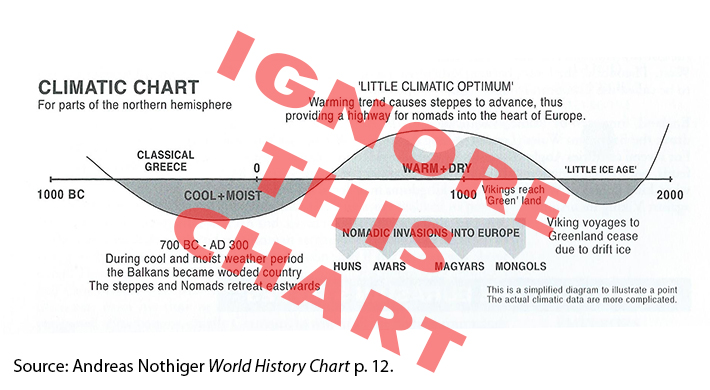
So the debate on man-made global warming just ended again. At any rate, so says Doug Saunders in the Globe and Mail. This time it’s not just the science.
Really effective international political action now looms, this time for sure. I also read on NBC that a new study has actually separated the man-made warming signal from the natural noise by taking 40 year intervals in which ”œthe human-forced trend comes out of the noise.” Curious that they didn’t tell us, the last 30 or 40 times the debate ended, that those studies had not accomplished this feat. It seems relevant.
It’s also a bit strange that just a month earlier, a different NBC story told me researchers had discovered previously unsuspected massive impacts on climate from the eruption of underseas volcanoes that seem to have contributed to major climate fluctuations over the past 800,000 years that are not man-made. Just more noise, I guess.
Personally I did not realize that science allowed us to posit different laws of cause and effect at different times in history; I thought it was a bit of a no-no. But apparently that debate ended too, because back in February the Ottawa Citizen and its sister papers reported that the United States was facing a ”œmegadrought” in the second half of this century that will be very like ”œdecades-long megadroughts in the region during the so-called medieval climate anomaly in the 12th and 13th centuries” except ”œworse” and, as you probably guessed, significantly influenced by man whereas the previous droughts of a similar sort in the same place were not. Or something. The Citizen story actually said ”œmany scientists agree that [the current severe California drought] is a naturally occurring event” before quoting a study co-author that ”œWe’re not necessarily locked into these levels of megadrought risk if we slow the effects of rising greenhouse gas on global temperatures.”
In the middle of all this contemplation of a terminated debate and for entirely unrelated reasons, I received a copy of a World History Chart by Andreas Nothiger, you know, one of those helpful foldouts that lays developments in various civilizations next to one another to help you get the big picture. And what’s super-weird is that it has in it, speaking of the ”œso-called medieval climate anomaly”, a simplified chart of temperature in ”œparts of the northern hemisphere” over the last 3000 years that, far from looking like a hockey stick, shows temperature rising and falling cyclically, going down from around 800 BC through the classical Greek period, then rising (and drying) steadily from shortly before the birth of Christ into the Dark Ages, cooling again toward the end of the Middle Ages (hence the end of Viking voyages to Greenland) and producing the ”œLittle Ice Age” of the 17th century before, um, warming steadily from around 1700.
So apparently the scientific debate ended with the discovery that a warming process that has been going on for over 300 years was not man-made for the first 250 but has been since, and a cycle of warming and cooling going on for 3000 years was not man-made for the first 2950 but has been since. And don’t even get me started on that 800,000 year cycle, or what happened in the Jurassic, or the pattern since the ”œCambrian explosion”. See, there’s no debate, nothing to see, just this odd business where the physical processes driving climate change for over 500 million years were suddenly replaced with a different set 50 years ago for reasons no one can explain.
How weird is that?







